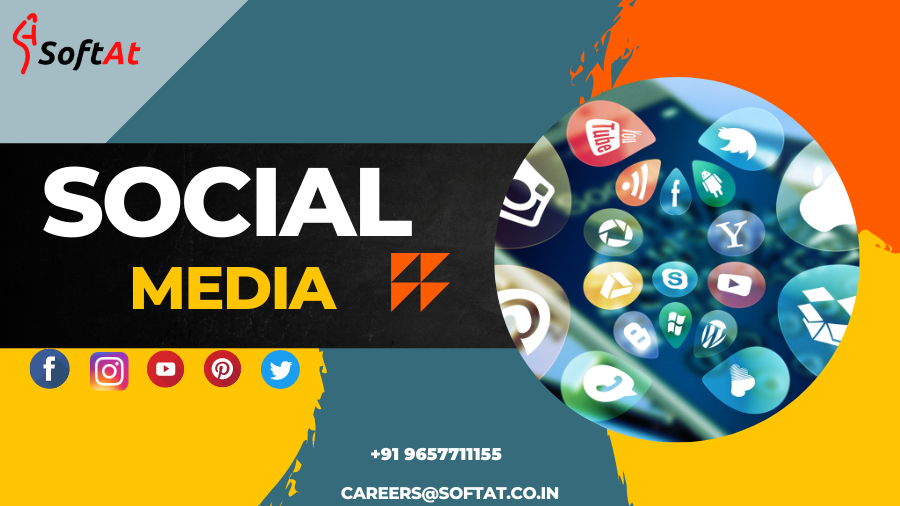Social networks have revolutionized the way we communicate and interact with each other. With over 4 billion users worldwide, Social platforms have become an integral part of our daily lives. In this blog, we will explore the impact of social media, its benefits and drawbacks, and ways to use Social platforms effectively.

• The impact of social media:
Social platforms have transformed the way we connect with others, share information, and consume news and entertainment. Some of the key impacts of Social platforms include:
- Increased connectivity: Social platforms allow us to connect with people worldwide and maintain relationships with family, friends, and colleagues.
- Amplified voices: Social platforms give individuals and groups a platform to share their opinions, promote their causes, and raise awareness about important issues.
- Information overload: With so much information available on social media, it can be challenging to filter out what is true and accurate.
- Risk of addiction: Social platforms can be addictive, and it is easy to spend hours scrolling through feeds and engaging with content.
• The benefits of social
• Brand Building:
Social platforms can be a powerful tool for building brand awareness, promoting products and services, and engaging with customers. Some of the key benefits of Social platforms for the brand building include:
- Increased visibility: Social platforms provide a platform for businesses to reach a large audience, including potential customers who may not have heard of the brand otherwise.
- Targeted advertising: Social platforms allow businesses to target their advertising to specific demographics, such as age, location, interests, and behaviors.
- Brand personality: Social platforms provide an opportunity for businesses to showcase their personality and values, which can help build brand loyalty and trust with customers.
- Customer engagement: Social platforms allow businesses to engage with customers in real-time, respond to inquiries and feedback, and build relationships with their audience.
• Networking in social media:
Social platforms can help individuals and businesses connect with others in their industry and build valuable professional relationships. Some of the key benefits of Social platforms for networking include:
- Increased exposure: Social platforms provide a platform for individuals and businesses to showcase their skills, experience, and knowledge to a large audience.
- Industry insights: Social media allows individuals and businesses to stay up-to-date on industry news, trends, and best practices.
- Collaboration opportunities: Social media provides an opportunity for individuals and businesses to connect with others in their industry and collaborate on projects, partnerships, and other initiatives.
- Professional development: Social media can be a valuable resource for professional development, including access to online courses, webinars, and other training opportunities.
• Information Sharing:
Social media makes it easy to share information and updates with a large audience, including news, blog posts, and other forms of content. Some of the key benefits of social media for information sharing include:
- Increased reach: Social media allows individuals and businesses to reach a large audience with their content, including potential customers who may not have discovered the content otherwise.
- Real-time updates: Social media provides a platform for individuals and businesses to share updates in real time, including news, events, and promotions.
- User-generated content: Social media allows individuals and businesses to share user-generated content, which can help build brand loyalty and trust with customers.
- Search engine optimization: Social media can have a positive impact on search engine optimization, as social media links and content can improve a website’s search engine ranking.
• Entertainment:
Social media provides a platform for sharing and consuming entertainment, including videos, music, and memes. Some of the key benefits of social media for entertainment include:
- Access to a wide range of content: Social media provides access to a wide range of entertainment content, including videos, music, and memes.
- Personalization: Social media platforms use algorithms to personalize the content that users see, which can improve the overall user experience.
- Community building: Social media provides an opportunity for individuals and businesses to build communities around shared interests, such as hobbies, fandoms, and causes.
- Viral content: Social media allows content to go viral, which can lead to increased exposure, brand awareness, and even sales.
• The drawbacks of social media:
While social media has many benefits, it is also important to consider the potential drawbacks of using these platforms. In this blog, we will explore the drawbacks of social media in detail, including its impact on mental health, privacy, online harassment, and addiction.
• Mental Health:
Social media can have a negative impact on mental health, particularly for young people. Some of the key drawbacks of social media for mental health include:
- Comparison and self-esteem: Social media can lead to unhealthy comparisons and a negative impact on self-esteem, as individuals may compare themselves to others and feel inadequate or unworthy.
- Cyberbullying: Social networks can be a platform for cyberbullying, which can have a devastating impact on mental health and well-being.
- Addiction: Social networks can be addictive, leading to a constant need for validation and engagement on the platform.
- Anxiety and depression: Social network use has been linked to anxiety and depression, particularly for individuals who spend a lot of time on these platforms.
• Privacy:
Social networks can be a significant threat to privacy, as users may share personal information without fully understanding the implications. Some of the key drawbacks of Social networks privacy include the:
- Data collection: Social network platforms collect vast amounts of data on users, which can be used for targeted advertising or sold to third-party companies.
- Security breaches: Social network platforms may be vulnerable to security breaches, which can lead to personal data being compromised or stolen.
- Stalking and harassment: Social networks can be a platform for stalking and harassment, particularly for individuals who share personal information or engage in controversial discussions.
- Geolocation: Social network platforms may track users’ location data, which can be used for targeted advertising or to identify a user’s whereabouts.
• Online Harassment on social media:
Social networks can be a platform for online harassment, which can have a significant impact on mental health and well-being. Some of the key drawbacks of Social network online harassment include:
- Cyberbullying: Social networks can be a platform for cyberbullying, which can be especially harmful to young people and individuals who are already vulnerable.
- Trolling and hate speech: Social networks can be a platform for trolling and hate speech, which can create a hostile environment for certain individuals or groups.
- Doxing: Social networks can be used for doxing, which involves sharing personal information about individuals without their consent.
- Cancel culture: Social networks can be used to “cancel” individuals or businesses, which can lead to reputational harm and loss of income.
• Addiction:
Social networks can be addictive, leading to a constant need for validation and engagement on the platform. Some of the key drawbacks of Social networks addiction include:
- Time-wasting: Social network addiction can lead to individuals spending excessive amounts of time on the platform, which can interfere with work or school obligations.
- Disconnection from real life: Social network addiction can lead to individuals disconnecting from real-life relationships and experiences.
- FOMO: Social network addiction can create a fear of missing out (FOMO), which can lead to compulsive checking of the platform.
- Self-esteem issues: Social network addiction can lead to self-esteem issues, as individuals may rely on the platform for validation and affirmation.
Which social media is best for freelancers?
The choice of social media platforms for freelancers depends on various factors, including the nature of their work, target audience, and personal preferences. Here are some popular social media platforms that can be beneficial for freelancers:
- LinkedIn: LinkedIn is a professional networking platform that allows freelancers to showcase their skills, experience, and portfolio. It is particularly useful for freelancers working in professional services, such as graphic design, writing, consulting, or programming. LinkedIn offers opportunities to connect with potential clients, join relevant industry groups, and establish thought leadership.
- Instagram: Instagram is a visual-centric platform that can be effective for freelancers in creative fields, such as photography, graphic design, fashion, or art. It provides a visually appealing way to showcase your work, share behind-the-scenes content, and engage with a community of followers. Effective use of hashtags and engaging with relevant accounts can help expand your reach.
- Twitter: Twitter is a fast-paced platform that enables freelancers to share updates, insights, and industry news in real-time. It can be valuable for freelancers in various fields, from writing and marketing to technology and journalism. Twitter allows for direct engagement with peers, potential clients, and industry influencers through conversations and networking.
- Facebook: Facebook is a versatile platform that can be useful for freelancers, depending on their target audience. It provides opportunities to join professional groups, share updates, and connect with potential clients or collaborators. Facebook can be especially beneficial for freelancers targeting local or niche markets.
- YouTube: YouTube is a video-sharing platform that can be utilized by freelancers to create educational or promotional content. It can be valuable for freelancers in fields such as tutoring, coaching, web development, or content creation. YouTube allows you to showcase your expertise, build a subscriber base, and monetize your content through ads or sponsored partnerships.
Remember, it’s not necessary to be active on all social media platforms. It’s more important to focus on platforms where your target audience is present and engage consistently with quality content. Experiment with different platforms, track your results and adjust your strategy based on the platforms that yield the best results for your freelance business.
conclusion
In conclusion, Social network has changed the way we communicate, connect, and consume information. While it has many benefits, it also has some drawbacks that individuals and businesses should be aware of. By following best practices and using Social networks effectively, you can harness its power to build your brand, engage with your audience, and achieve your goals.





